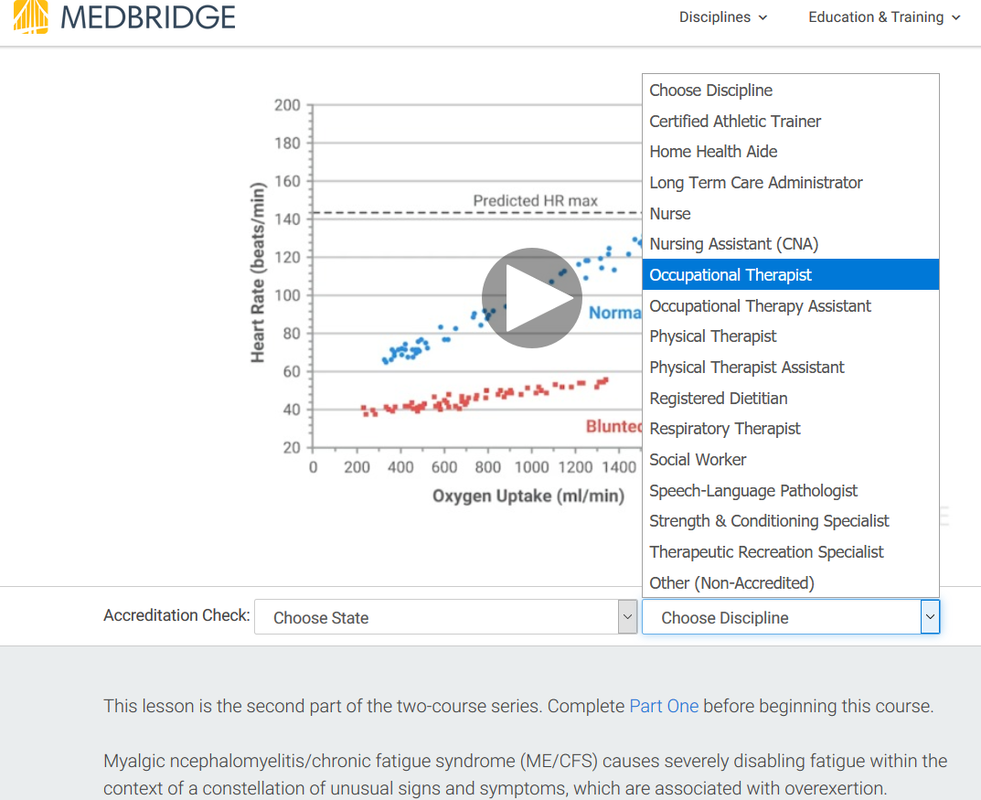The course seems to consist of the following:
Part 1: Introduction and Identification
Chapter 1: What's in a name and why does it matter
There's 2 x 20 minute lectures
Chapter 2: Objective evidence of Post-Exertional Malaise and Exercise Impairment in ME/CFS
again 2 lectures
Part 2: Etiology and Analeptic Management
Chapter 1: Etiological clues from CPET
Chapter 2: Analeptic strategies for ME/CFS
I found the Medbridge site confusing, not helped, I am sure by my trying to do what I could for free. I did the sections in bold without having to pay anything.
I'm really sorry to say that I found the sections I did to not be worth the high cost.
Part 1: Chapter 1: Lecture 1
It's 20 minutes long. There's quite a bit of listing what will be achieved, which gets overwhelming. And then there's 10 minutes of discussion about false positives and false negatives and sensitivity and specificity - none of that related to ME/CFS. I seriously thought I was in the wrong lecture. So after that 10 minutes, we learn that we have to rely on case definitions for ME/CFS, and so there's a discussion of the various criteria and how they were developed. This is ok, but it's a lot of detail for physical therapists who just want to know what they can do to help people with ME/CFS. At the 19 minute mark, we are told that it's not a rare disorder and some prevalences for the US are given.
Part 1: Chapter 1: Lecture 2
Also 20 minutes long. So, I think up to the 17 minute mark was mostly patients being interviewed about their diagnosis process. This is not a criticism of the patients - but getting a diagnosis of ME/CFS is tedious and complicated and confusing, and recounting of the process in unscripted interviews can reflect that. I don't think it will be super compelling for people with just a limited level of interest in ME/CFS. I think much more editing to just include key bits from patients would work better. And again, I don't think this needs to be the focus for physios/physical therapists who probably won't be doing the diagnosing.
After the interviews there is some information about the the severity of the disease. I found it confusing and I probably know quite a bit more about ME/CFS than the target audience. The slides didn't match with a lot of what was being said. It was as if the narration and the slides weren't coordinated properly. I spent so much time being confused about what was going on that I didn't really take away much information.
Here's one example slide, this is the full slide - and there were only 4 slides. It was shown while SF36 scores in ME/CFS, healthy controls, rheumatoid arthritis and cancer and depression and heart disease were talked about.

I think the sections I didn't do are the ones that would be the most interesting, after all they would be on the material that Workwell are experts in. But I'm afraid that I lost confidence in the product and didn't feel that I could justify what is quite a lot of money to buy it. I think the course could do with a rethink, to get into the meat of things quickly and focus on what physical therapists need to know.
I'm sorry if I have got things wrong. I'd really like to hear what others think of the course.


